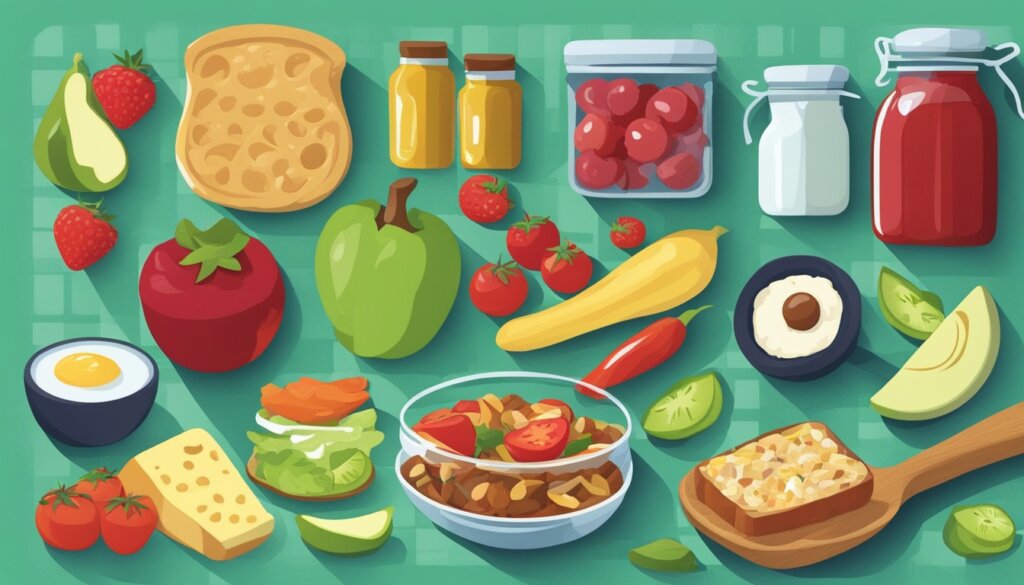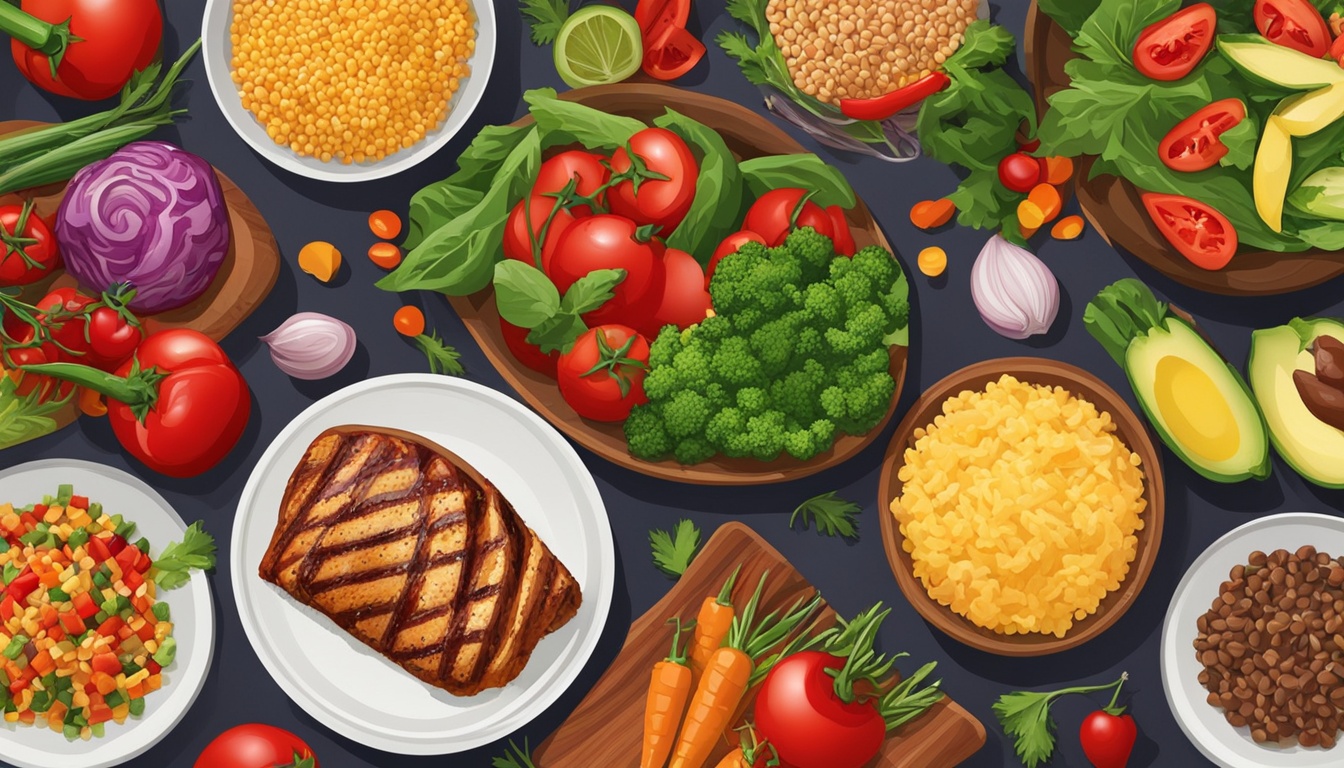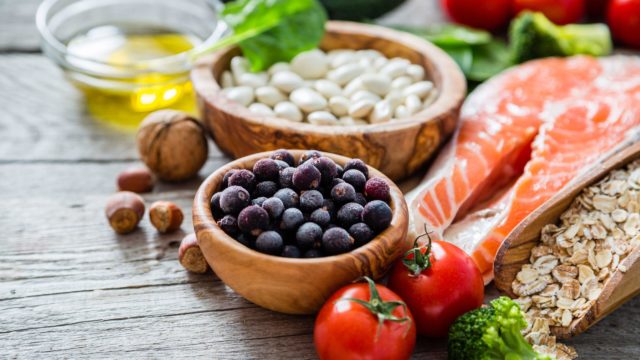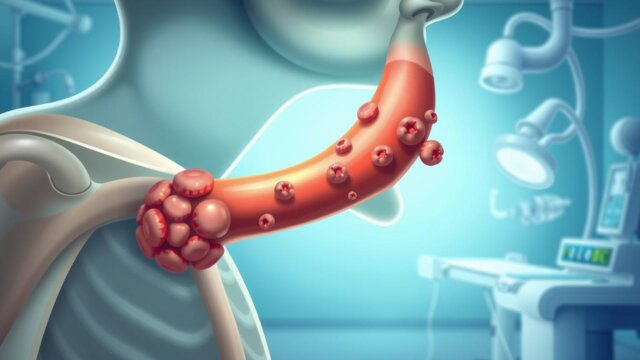FTC disclaimer: This post may contains affiliate links and we will be compensated if you click on a link and make a purchase.
Did you know that cutting back on saturated fat can reduce heart disease risk by 25%? These fats are often in animal-based foods and tropical oils. They can raise your bad cholesterol, which is bad for your heart. By choosing lean proteins, more vegetables, and good fats, you make your heart and cholesterol better. Eating less saturated fat is key to a healthy, balanced diet.
Key Takeaways
- Saturated fats can raise LDL (bad) cholesterol levels and increase the risk of heart disease.
- Replacing high-saturated fat foods with lean proteins, plant-based foods, and unsaturated fats can improve heart health and lower cholesterol.
- Following a low-saturated fat diet is an important part of a balanced, nutrient-rich lifestyle.
- Reducing saturated fat intake and focusing on healthier fats can provide long-term benefits for your overall well-being.
- Making informed choices and incorporating practical strategies can help you successfully maintain a low-saturated fat diet.
Understanding Saturated Fats
Saturated fats are solid at room temperature. They come from animal-based foods, like meat and dairy. Also, they are in coconut and palm oils. Too much of these fats is bad for your health.
What are Saturated Fats?
Saturated fats have a special structure. This structure makes them solid at room temperature. Unlike unsaturated fats, they are not usually liquid.
Sources of Saturated Fats
Animal-based foods are the main source of saturated fats. This includes meat, dairy, and eggs. They are also in coconut and palm oils. You can find saturated fats in processed and fried foods too.
Some saturated fats, like those in full-fat dairy, are okay for the heart. But, too many fried foods can cause obesity and heart problems.
Health Risks of High Saturated Fat Intake
Eating too much saturated fat can make our LDL (bad) cholesterol go up. This increases the chance of heart disease and stroke. A lot of LDL cholesterol is not good. It can cause plaque to build up in our arteries, which leads to heart problems.
Impact on Cholesterol Levels
Saturated fats boost LDL cholesterol levels in our blood. LDL cholesterol is called the “bad” type because it helps build plaque in our arteries. This raises the risks of heart disease and stroke.
Increased Risk of Heart Disease
Too much LDL cholesterol in our blood means a higher risk of heart disease and stroke. Diets high in saturated fats are often the cause. These fats are solid at room temperature and can clog our arteries. This can lead to serious heart issues. Foods with a lot of saturated fat are beef, pork, poultry, full-fat dairy, eggs, and tropical oils like coconut and palm.
Saturated fats are not good for our cholesterol and increase the heart disease risk. The American Heart Association says we should get only 5% to 6% of our calories from saturated fat. But, many eat more than this. It’s bad for the heart.
Benefits of a Low-Saturated Fat Diet
Taking in less saturated fats and using better choices can help a lot. You will help your heart, lower bad cholesterol, and live a healthier life. This change is pretty easy but makes a big difference.
Improved Heart Health
Eating less saturated fat can reduce the chance of heart issues. These fats mainly come from animals. Lowering them can better your cardiovascular health.
Lower Cholesterol Levels
Choosing unsaturated fats over saturated ones is great for your cholesterol. Use oils from plants, nuts, and avocados. This change can help reduce heart risks by cutting down on bad cholesterol.
Balanced Lifestyle
A diet low in saturated fats helps you live better. Pick fats that are good for you and eat less high-fat foods. You’ll build a diet that supports your health better.
Adding these benefits to your life is key for better heart and cholesterol health. This diet makes it easier to live well. It boosts your health and happiness.
Practical Tips for Reducing Saturated Fat Intake
Adopting a low-saturated fat diet needs you to be active. You can do a lot of things to cut down on this harmful fat. First off, look at nutrition labels closely. Find foods with less saturated fats.
If a product has over 5g of saturates in each 100g, it might be marked in red. Those with 1.5g to 5g are usually amber. And anything 1.5g or lower gets a green light. This info guides you to healthier options, cutting down on saturated fats.
Choosing Lean Meats and Plant-Based Proteins
For protein, go with lean meats and plant-based proteins instead of fatty choices. Always remove any visible fat from meats. Pick the healthier cuts, like turkey or chicken breast. Adding more plant-based proteins, such as beans, tofu, and tempeh, also lowers your saturated fat intake. These options bring in many essential nutrients, too.
Cooking Methods that Minimize Fat
How you cook plays a big role in how much saturated fat you eat. Skip the frying or roasting. Go for baking, broiling, poaching, or steaming your food. These ways of cooking use less fat. So, you get to enjoy tasty meals that are low in saturated fats.

Follow these simple tips to lower your saturated fat intake. Making small changes in how you eat can lead to a much healthier diet. Always remember, even little steps can make a big difference in how you feel.
Healthy Fat Alternatives
It’s better to use healthy unsaturated fats in your food, unlike saturated fats. Choose monounsaturated fats from olive oil, avocados, and nuts. And pick polyunsaturated fats in fatty fish, seeds, and oils from plants.
The 2015–2020 Dietary Guidelines for Americans say to eat less than 10% of saturated fats a day. This helps keep you healthy.
Monounsaturated Fats
Olive oil, avocados, and nuts have monounsaturated fats. They lower your LDL (bad) cholesterol and heart disease risk. These fats are easy to use in cooking, dressing, and snacks.
Polyunsaturated Fats
Foods like fatty fish, seeds, and plant oils have polyunsaturated fats. Switching from saturated to unsaturated fats helps your health. It lowers LDL cholesterol and heart disease risk.
Omega-3 Fatty Acids
Omega-3 fats are great for your heart. Find them in foods like salmon, tuna, walnuts, and flaxseeds. Adding these foods in your diet makes it more healthful.
Use these healthy fats for a diet that’s good for your heart and your whole body. Stay away from too much saturated fat. That way, you keep your cholesterol and arteries healthy.
Low-saturated fat Meal Planning
When planning meals with low-saturated fat, focus on balance. Include the right portion sizes and a mix of healthy foods. This method helps you eat what you need while keeping the bad fats low.
Balanced Meals and Portion Control
To eat less saturated fat, pick lean proteins like fish and skinless chicken. Eat three to four egg yolks a week at most. Use nonfat or low-fat dairy too.
Choose whole-grain breads, pastas, and brown rice for grains. Cook meats and poultry by baking, broiling, or roasting. Avoid deep-frying. Use oil sprays to grease pans for less saturated fats.
Incorporating Nutrient-Rich Foods
For a good low-saturated fat diet, eat a variety of nutrient-rich foods. Include fruits, veggies, whole grains, and lean proteins. Add in good fats from nuts, avocado, and olive oil. These help your heart.
Focus on meals that taste great and keep you healthy. Use low-saturated fat food options.

Eating low-saturated fat doesn’t mean giving up what you love. It’s about making smart choices that fit your needs. These tips will help you have a better diet. They also keep your heart and health in check.
Low-Saturated Fat Recipes
Starting a low-saturated fat diet is tasty and fulfilling. Dive into recipes with fresh salads and dressings, protein-packed meals, and plant-based eats. They’ll make your meals and snacks healthier without losing flavor.
Healthy Salads and Dressings
Begin with a crisp salad filled with veggies and protein. Add a light dressing using good fats. Think olive or avocado oil. It’s a tasty and good-for-your-heart meal starter.
Lean Protein Dishes
Choose low-fat meats, tuna, or veggies like lentils and beans. Using cooking methods like baking, broiling, or steaming helps keep fat low.
Plant-Based Entrees
Vegan and vegetarian plates with hearty ingredients like lentils and tofu are top picks. They offer a full, nutritious meal for everyone. Plus, they meet different diet needs.
Recipe | Saturated Fat (g) | Total Fat (g) | Calories |
|---|---|---|---|
Grilled Salmon with Avocado Salsa | 2.5 | 14 | 280 |
Quinoa and Black Bean Stuffed Peppers | 1.5 | 8 | 260 |
Roasted Butternut Squash and Kale Salad | 1 | 6 | 220 |
Baked Chicken Parmesan with Zucchini Noodles | 3 | 12 | 310 |
Lifestyle Changes for Heart Health
Adding a low-saturated fat diet isn’t the only way to support your heart. Doing regular exercise and managing stress are also key. They offer big benefits for your health and how long you live.
Regular Exercise
Try to get 150 minutes of moderate activity or 75 minutes of intense activity each week. You can work out in short bursts every day. For example, park far and take the stairs. This helps prevent heart disease and has many health perks.
Stress Management
Long-term stress can raise your blood pressure and heart disease risk. But, you can use things like meditation or deep breathing to handle stress better. This is good for your heart health overall.
Eating right and making these changes go a long way for healthy hearts. Combining these steps with a healthy diet is the best approach to take care of your heart. This also helps you live longer.

Low-Saturated Fat Diet for Cholesterol Management
Choosing a low-saturated fat diet is great for managing cholesterol. It cuts down on the fats that make LDL (bad) cholesterol high. This diet helps reduce your total cholesterol and keeps your heart healthy.
Eating less saturated fat lowers your LDL cholesterol. Having too much LDL is bad because it can clog your arteries. That can lead to heart issues and even stroke. Picking foods from a low-cholesterol, low-saturated fat diet is a smart move for your heart.
This diet also helps manage your overall cholesterol. It adds healthy proteins like fish and limits fatty snacks. These changes can improve your cholesterol levels. Plus, they lower your risks of heart problems.
Adding this diet to your life is proactive for your heart. It involves choosing foods that are good for you. Doing this can help meet your goals for managing cholesterol, keeping it low, and taking care of your heart. It’s a great way to boost your health.
Plant-Based Oils and Low-Saturated Fat Cooking
Choosing the right oil is key for a low-saturated fat diet. Plant-based oils like olive and avocado are liquid at room temperature. These are great for the heart. On the other hand, oils such as coconut or palm oil are solid at room temperature. They have more saturated fats.
Olive Oil
Olive oil is great for cooking and good for your heart. It’s full of monounsaturated fats. They help lower cholesterol and improve heart health. You can use olive oil in many ways, from cooking to making dressings.
Avocado Oil
Avocado oil is another top pick for cooking meals that are low in saturated fats. It’s also rich in monounsaturated fats, like olive oil. But it has its own advantages. It has a mild taste and a high smoke point. This makes it perfect for high-heat cooking methods.
Nut Oils
Don’t forget about nut oils like walnuts, almonds, or hazelnuts. They have good fats for your heart. These oils also add a nutty flavor to your dishes, like dressings and baked goods.
Choosing oils from plants means making tasty, healthy dishes. It’s good for your heart and overall, keeps you healthy.

Integrating Low-Saturated Fat Foods into Your Diet
To keep a low-saturated fat diet, choose low-saturated fat foods daily. Meal prepping and planning are great ways to do this. Make your meals ahead and set up your menu weekly. This helps keep low-saturated fat foods around easily.
When planning meals, add different healthy snack options that are low in saturated fat. Good choices are fresh fruits, veggies, nuts, and low-fat dairy. These snacks help beat cravings and keep you on track with your diet goals.
Using meal prep, planning, and smart snack choices helps you stick to a low-saturated fat diet. It ensures you get the right nutrition all day long. So, work on including low-saturated fat foods in your daily plan.
Low-Saturated Fat Diet and Weight Management
A low-saturated fat diet helps manage weight by balanced, nutrient-rich eating. It cuts down on the high-calorie, high-fat foods. To lose weight, you need to eat fewer calories, move more, or do both. Mixing this diet with exercise helps keep a healthy weight.
Adding healthy snacks is key to a balanced diet. Go for whole-grain options in bread, cereals, pasta, and rice for a low-saturated fat diet. Pick nonfat or low-fat dairy like milk, yogurt, and cottage cheese for less fat. Cook with vegetable oils, such as canola or olive, instead of butter and margarine.
It’s important to check food labels for saturated and trans fats to help manage weight. Choose lean meats like fish, chicken, turkey, and tofu for a low-saturated fat diet. Avoiding high-fat processed and convenience foods is good for weight control.
Overcoming Challenges of a Low-Saturated Fat Lifestyle
Choosing a low-saturated fat lifestyle is good for health. But it can be hard to do sometimes. You might find it tough at restaurants or parties. Avoiding foods high in saturated fat needs smart thinking and planning.
Dining Out
Eating at restaurants while on a low-saturated fat diet can be tricky. Yet, it’s doable with a little preparation. Pick foods lower in fat, like grilled fish, and ask for no added butter. Choose steamed or roasted veggies as a side. Pick sauces and dressings that are not high in fat. This way, you can enjoy eating out and stick to your diet goals.
Social Gatherings
Parties and social events might pose challenges, too. Stay aware of what food is available and choose wisely. Bringing a low-fat dish can ensure there’s something healthy for you to eat. Remember, you can say no to fatty foods and still have a good time talking with people.
Cravings and Temptations
Craving high-saturated fat foods is natural at times. To counter this, keep healthy snacks nearby. Fruits, veggies, and unsalted nuts are good choices. If tempted, try distracting yourself. Or have a small, healthy snack to curb the craving. With these strategies, you can keep your low-saturated fat diet on track.
Adjusting to a low-saturated fat lifestyle can be challenging. But the health benefits are worth it. By thinking ahead, choosing wisely, and using coping techniques, you can manage your diet. This applies to social events and eating out.
Low-Saturated Fat Diet for Families
A low-saturated fat diet is good for your whole family, kids included. Getting kids to help with meals and packing lunch benefits everyone. It makes sure they learn how to eat well and enjoy the low-saturated fat lifestyle.
Involving Children in Meal Preparation
Having kids help with cooking is both fun and teaches them well. They can do simple tasks like cutting up veggies or measuring ingredients. Learning this way helps them like new healthy foods and understand low-saturated fat diets.
Nutritious Lunchbox Ideas
Putting together healthy lunchboxes is key for your kids’ nutrition. Fill them with a mix of fruits, veggies, lean proteins, and whole grains. Stay away from high-fat, high-salt snacks. Pick low-fat options, such as mozzarella cheese, and go for lean meats instead of fatty ones. With a bit of planning and kids’ help, you can make lunches that are good for a low-saturated fat diet.
Conclusion
Eating less saturated fat is key to a healthy heart. It helps manage cholesterol and keeps you feeling good. By choosing foods low in saturated fats, you can shape a well-nutrient lifestyle.
The link between saturated fats and heart disease is not totally clear. But, we do know that switching these fats for unsaturated ones is good for us. Foods like nuts, seeds, fish, and avocados help keep our hearts strong.
To eat more heart-healthy, plan your meals carefully. Add in those healthy fats where you can. And don’t forget, diet goes hand in hand with exercise and staying calm. Together, they build a path to a brighter, healthier life.
FAQ
What are saturated fats and where are they found?
Saturated fats are solid at room temperature. You can find them in foods from animals. This includes meat, dairy, and eggs. They are also in certain oils like coconut and palm.
How do saturated fats impact cholesterol levels?
Too much saturated fat can raise bad cholesterol levels. This increases heart disease and stroke risks. It’s key in developing artery plaque, which is bad for the heart.
What are the benefits of a low-saturated fat diet?
A diet low in saturated fat is good for the heart. It can help lower bad cholesterol. It also promotes overall good health and well-being. Eating less of these fats reduces heart disease risk.
How can I reduce my saturated fat intake?
Start by looking at food labels. Choose items lower in saturated fat. Pick lean meats and plant proteins. Cook with methods that use less fat, like baking or steaming.
What are some healthy alternatives to saturated fats?
Healthy fats are a better choice. Use monounsaturated fats from olive oil, avocados, and nuts. Polyunsaturated fats in fish, seeds, and vegetable oils are good too. These include omega-3s, which are great for the heart.
How can a low-saturated fat diet help with weight management?
It’s good for managing weight. This diet is full of nutrients but not high in calories. Combine it with exercise for best results.
What are some challenges of maintaining a low-saturated fat lifestyle?
Sticking to this diet can be hard at times. Eating out, social events and cravings can be tough. Yet, planning and wise choices help a lot. Finding strategies to cope is key.
How can a low-saturated fat diet benefit the whole family?
Going low on saturated fats is good for everyone, including kids. Meal prep and packing lunches are great ways to involve children. It builds healthy eating habits for life.








